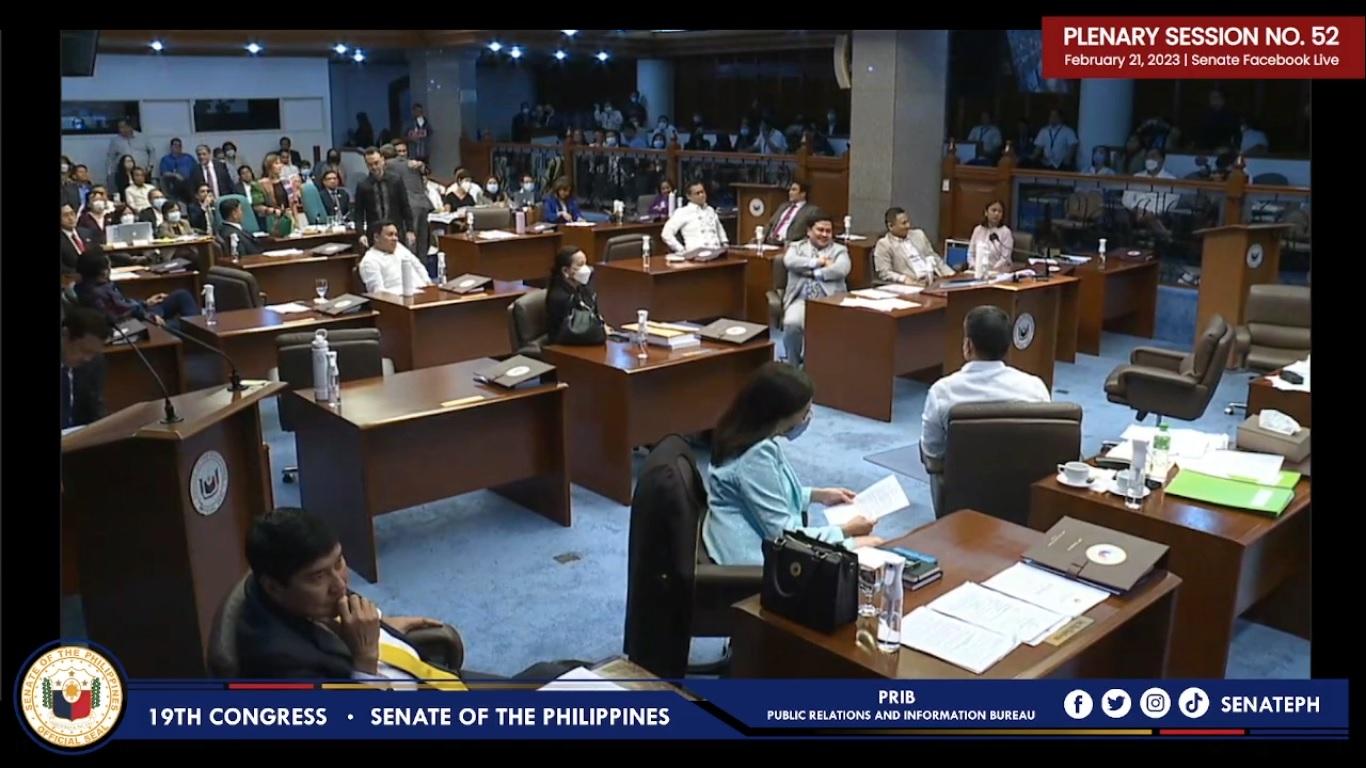Philippine Senate concurs with RCEP ratification

The Senate on Tuesday concurred with the Philippine government's ratification of the Regional Comprehensive Economic Partnership (RCEP).
Twenty senators voted for Resolution No. 485 concurring with the ratification of the trade agreement, while one voted against it and one abstained.
Senator Risa Hontiveros voted no to the concurrence, while Senator Imee Marcos abstained.
The RCEP is a free trade agreement first floated in August 2012, covering members of the Association of Southeast Asian Nations (ASEAN) and its partners Australia, China, Japan, South Korea, and New Zealand.
It was ratified by then-President Rodrigo Duterte in September 2021 and by President Ferdinand "Bongbong" Marcos Jr. in November 2022, and it had been up for Senate concurrence. At least two-thirds of the upper chamber must concur to an international agreement or treaty to make it valid and effective.
The Senate's nod came barely a week after its top leaders sponsored the mega trade deal in the plenary.
Senate President Juan Miguel Zubiri said in his sponsorship speech that in a globalized economy, the Philippines cannot afford to isolate itself from the rest of the world or even send a signal to that effect.
"Sadly, to date, the Philippines is the only RCEP signatory state that has not yet concurred in the ratification of the RCEP Agreement, and businesses and foreign investors are already getting wary about the consistency of our trade and investment policy direction," Zubiri earlier said.
He claimed that after RCEP took effect last January 1, 2022, countries in the ASEAN have already been reaping the benefits of the trade deal.
The Senate president said the RCEP promises better trading, more jobs, and cheaper commodities.
'This is not the time for RCEP'
After casting the lone dissenting vote, Hontiveros said that she did so because she is concerned that the treaty may have an adverse effect on Filipinos' health; because of the chance the Philippines' trade balance may actually suffer as a result; and because many groups have voiced their misgivings.
"I am not persuaded that the health and security exception sufficiently protects our citizens from the onslaught of tobacco and formula milk advertisements," she said. "Kahit may batas pa tayo na pinagbabawal ang tobacco advertisements, paano nga kung hamunin tayo for non-compliance with RCEP?"
She added that Rashmi Banga, a senior economist with the United Nations, conducted a study that found that "the Philippines' goods trade balance would worsen by US$264 million a year and it would lose tariff revenues of US$58 million a year."
Finally—and, said Hontiveros, most importantly—"I have with me a letter of 131 organizations from various groups around the country. Mga grupo ng magsasaka, mga grupo ng mangingisda, mga trade union, mga health advocates, mga fair trade advocates. These represent millions of Filipinos who say that our country is not ready for this deal, that we already obtain the benefits from our other agreements, and that we even stand to lose."
Marcos, meanwhile, signified her intention to abstain from the vote due to her resolve to stand by her father's legacy which, she said, was to "laging unahin ang maliliit, ang mga nagsasaka ng lupa, at ng lahat ng mga nangangailangan."
While he cited many benefits of RCEP in other countries that are signatories to the trade agreement, Zubiri said they understand the issues and concerns of some groups of farmers who oppose its ratification.
He gave an assurance that RCEP will not kill the local agriculture sector, as highly sensitive agricultural products are not included in the tariff liberalization.
The Department of Trade and Industry has since clarified that highly sensitive agricultural products for the Philippines are excluded from the country’s Schedule of Commitments, which means that these products are still protected by tariffs.
Some of these agricultural products include swine meat, poultry meat, potatoes, onions, garlic, cabbages, sugar, carrots, and rice.
Past attempt
It is the second time that the RCEP was tackled in the Senate plenary.
RCEP was approved by the previous administration in September 2021 and brought to the Senate for concurrence.
In the 18th Congress, then-Senate foreign relations committee chairman Aquilino "Koko" Pimentel III sponsored the trade deal in the plenary for its ratification. However, the Senate was not able to finish the debates on RCEP.
President Marcos earlier called for the Senate's concurrence to the ratification of RCEP.
Some senators have expressed reservations, including the president's sister Senator Marcos, who said that the trade deal would kill the local agriculture industry.
Marcos, as chairperson of the Senate foreign relations committee, was supposed to lead the hearings on RCEP but due to her reservations, the Senate formed a subcommittee chaired by Senate President Pro Tempore Loren Legarda.
During one of the hearings of the subcommittee, poultry and agriculture producers had asked the government to give a “clear path for development” for their sectors before ratifying the RCEP.
Sixteen senators signed the committee report on RCEP: Zubiri, Legarda, Majority Leader Joel Villanueva, Minority Leader Pimentel, Francis Tolentino, Robin Padilla, Mark Villar, Jinggoy Estrada, Lito Lapid, Bong Revilla, Sonny Angara, Win Gatchalian, JV Ejercito, Nancy Binay, Ronald Dela Rosa, and Grace Poe.
Before he assumed office, the President expressed his reservations about the RCEP, saying he wanted to look at how it would impact the country’s agriculture sector.
But in his latest statements, the President said that "time will prove that it is to our advantage." — BM, GMA Integrated News




